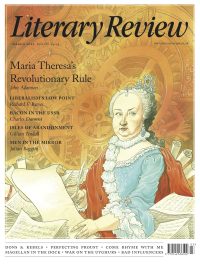Piers Brendon
Kiss & Shell
False Prophets: British Leaders’ Fateful Fascination with the Middle East from Suez to Syria
By Nigel Ashton
Atlantic Books 469pp £20
Nigel Ashton’s scholarly study, which straddles two of the most disastrous episodes in our recent history, the invasions of Suez and Iraq, opens in 1942, when Rommel’s panzers seemed on the brink of conquering Egypt. As staff at the British embassy in Cairo made bonfires of their sensitive files and street mobs chanted ‘Forward Rommel’, wits quipped that the only thing that could hold him up was the slow service in Shepheard’s Hotel. Fearing that the British Empire would be cut in half, Anthony Eden, Churchill’s foreign secretary, declared, ‘Our history and geography demand that we should remain a world power.’
He was certainly speaking at a seminal moment. But, as Ashton might have explained, the British preoccupation with the Middle East went back at least as far as Napoleon’s Egyptian expedition and the threat it allegedly posed to our hold on India. It was fundamentally to protect what Lord Salisbury called the ‘Jewel of the Empire’ that Disraeli acquired partial control of the Suez Canal in 1875, that Gladstone occupied Egypt in 1882 and that Lloyd George participated in the colonial carve-up of Ottoman possessions after the First World War.
Of course, by 1956 India had long been independent, but the Middle East had acquired strategic importance of another kind, as the world’s prime oil well. Eden feared that Britain’s access to it would be curtailed by communists and nationalists, the most dangerous of the latter being Egypt’s military

Sign Up to our newsletter
Receive free articles, highlights from the archive, news, details of prizes, and much more.@Lit_Review
Follow Literary Review on Twitter
Twitter Feed
It wasn’t until 1825 that Pepys’s diary became available for the first time. How it was eventually decrypted and published is a story of subterfuge and duplicity.
Kate Loveman tells the tale.
Kate Loveman - Publishing Pepys
Kate Loveman: Publishing Pepys
literaryreview.co.uk
Arthur Christopher Benson was a pillar of the Edwardian establishment. He was supremely well connected. As his newly published diaries reveal, he was also riotously indiscreet.
Piers Brendon compares Benson’s journals to others from the 20th century.
Piers Brendon - Land of Dopes & Tories
Piers Brendon: Land of Dopes & Tories - The Benson Diaries: Selections from the Diary of Arthur Christopher Benson by Eamon Duffy & Ronald Hyam (edd)
literaryreview.co.uk
Of the siblings Gwen and Augustus John, it is Augustus who has commanded most attention from collectors and connoisseurs.
Was he really the finer artist, asks Tanya Harrod, or is it time Gwen emerged from her brother’s shadow?
Tanya Harrod - Cut from the Same Canvas
Tanya Harrod: Cut from the Same Canvas - Artists, Siblings, Visionaries: The Lives and Loves of Gwen and Augustus John by Judith Mackrell
literaryreview.co.uk